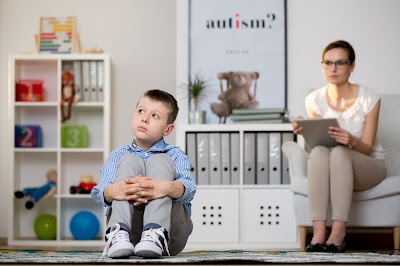Autism in Children and its Treatment
Why does autism develop?
It is unclear what precisely causes autism. Many factors, including heredity and brain development, may be at play.
Early in life, especially during the first three years of life, children diagnosed with autism spectrum disorder usually exhibit faster-than-average brain development. The reason for this rapid growth is unknown to us. Nonetheless, studies show that children with autism connect with some brain areas in an atypical way.

autism-in-children-and-its-treatment
There is strong evidence linking autism to a genetic basis. It is unlikely; nevertheless, that autism is brought on by a single gene. There is a greater chance of many genes combining and functioning in concert. Researchers have found many possible genes that might have a role in the development of autism.
Signs of Autism
Autism's early symptoms frequently appear before the age of two.

autism-in-children-and-its-treatment
Different youngsters learn social and communication skills in different ways during their first year of life. After receiving an autism diagnosis, children may, for example:
• Not
grinning back at people;
• Not
using movements or making eye contact;
• As children become bigger and should begin engaging and playing with other children, autistic symptoms become more apparent during this phase.
Children with autism, for instance, may:
1. They interact with other children indifferently, imitate what they hear, and talk in an unusual tone of voice.
2. While some kids exhibit few early warning signs, others exhibit a lot.
3. The degree of symptoms differs according to the children's age and the how autism impacts their day-to-day existence.
Children who have trouble making friends, understanding and adhering to instructions, or engaging in age-appropriate interests may be autistic. This is particularly valid for teenagers and older children.
Autism diagnosis
Autism is frequently diagnosed at the age of two, however it can be ascertained as early as 12 to 18 months.
A diagnosis usually requires a multidisciplinary assessment, which involves the child being tested and evaluated by many doctors and professionals.
A multidisciplinary team consists of a physician, a child psychologist, a speech pathologist, and sometimes a psychiatrist. It could also include other medical professionals, including an occupational therapist.
These professionals could assess a child at the same time and place. As an alternative, they might perform one-on-one assessments at different times and places. Should this assessment approach be employed, the specialists will converse and share their discoveries.
There isn't a single test for autism. Instead, diagnosis is based on:
1. Looking at children's play and social interactions, or how they are developing right now; conducting parent interviews to examine children's developmental history or how they have evolved in the past.
2. Diagnoses for autism spectrum disorder in children will be made. The diagnosis will contain support levels, ranging from "requiring support" to "requiring very substantial support." These levels show how much support children need for social and communication skills, as well as restricted, repetitive, and/or sensory behaviors.
Medical professionals will also assess children's language and cognitive abilities.
Children
who just show difficulties with social communication may be diagnosed with
social communication disorder rather than autistic spectrum condition.
What should you do if you're concerned about the growth of your child?
If you are concerned about your child's development, make an appointment with your general practitioner (GP) or child and family health nurse for a developmental review. Receiving support and programs that are tailoblack to your child's needs begins with having them evaluated and diagnosed.
It's critical to get help and support as soon as you can. Early treatment is the best way to help and nurture autistic children as they grow and develop. This is due to the fact that they can help children with autism develop the skills needed for daily chores. Sometimes, as a kid becomes older, early intervention might lessen or completely eliminate their need for assistance.
Children diagnosed with autism have three key characteristics.
Incapacity to
interact and converse with others:
Children could, for example:
· Avoid staring someone in the eye to get their attention.
· Lack the ability to convey ideas through words or gestures, become confused by language, and take things literally.
Limited passions:
Children might just play with cars or collect
sticks
Repeated behaviors:
Children could, for example:
·
Make repetitive noises like sighs, clearing
their throats, or screams;
·
Make repetitive movements like body swaying
or flapping of the hands;
· Carry out repetitive tasks like repeatedly flicking on light switches.
Extra characteristics
Sensory sensitivity to taste, touch, sight, and sound can also be excessive or lacking in children with autism. As an example, they might:
· Get readily aroused by particular sounds
· Limit your diet to certain foods.
· Keep an eye out for vibrating objects, like the washing machine, and watch the light flicker by flicking your fingers in front of your eyes.
These characteristics are present in children with autism because their brain development differs from other children's development.
In summary
TalktoAngel
is the greatest online counseling platform when it comes to autism and
its treatment. It helps manage an autistic child's behavior, which in turn
helps them build their future and well-being as a whole.
The greatest child psychologists, qualified to work with autistic children, are available at TalktoAngel. You may treat your kid in the comfort of your own home. TalktoAngel is a good option if you're searching for a child psychologist.






Post a Comment